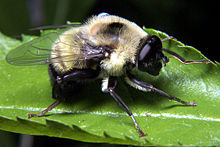Mallota
Appearance
| Mallota | |
|---|---|

| |
| Mallota spp possibly cimbiciformis | |
| Scientific classification | |
| Domain: | Eukaryota |
| Kingdom: | Animalia |
| Phylum: | Arthropoda |
| Class: | Insecta |
| Order: | Diptera |
| Family: | Syrphidae |
| Subtribe: | Helophilina |
| Genus: | Mallota Meigen, 1822[1] |
| Species | |
|
>75 species | |
Mallota is a widely distributed Holarctic genus of hoverfly (a member of the fly family Syrphidae), well known for their bee-like appearance.
Species
[edit]- M. abdominalis Sack, 1927
- M. aenigma Bezzi, 1912[2]
- M. albipilis Snow, 1895[3]
- M. albipes Snow, 1895
- M. bautias (Walker, 1849)
- M. bequaerti Hull, 1956
- M. bicolor Sack, 1910
- M. cimbiciformis (Fallén, 1817)
- M. cingulata Sack, 1927
- M. curvigaster (Macquart, 1842)[4][5]
- M. dasyops (Wiedemann, 1819)
- M. dusmeti Andreu, 1925
- M. extrema (Loew, 1858)
- M. fuciformis (Fabricius, 1794)
- M. hirsuta Hull, 1941
- M. illinoensis Robertson, 1901[6]
- M. inopinata Violovich, 1975[7]
- M. megilliformis (Fallén, 1817)
- M. meromacrimima Hull, 1941
- M. mississipensis Hull, 1946[8]
- M. munda Violovich, 1955[9]
- M. orientalis Wiedemann, 1824[10]
- M. posticata (Fabricius, 1805)
- M. rossica Portschinsky, 1877[11]
- M. rubripes Matsumura, 1916
- M. sackeni Williston, 1882
- M. shatalkini Mutin, 1999[12]
- M. spinosa Hirooka & Maruyama, 2015[13]
- M. thompsoni Hirooka & Maruyama, 2015[13]
- M. tricolor Loew, 1871
- M. vilis Wiedemann, 1830 ("Non-European Two-Winged Insects as a Continuation of Meigen's Work. Second Part.") [14]
- M. viridiflavescentis Huo & Ren, 2006[15]
References
[edit]- ^ Meigen, Johann Wilhelm (1822). Systematische Beschreibung der bekannten europäische n zweiflugeligen Insekten. Hamm: Dritter Theil. Schulz-Wundermann. pp. x, 416, pls. 22–32. Retrieved 14 April 2019.
- ^ Bezzi, M. (1912). "Ditteri raccolti da Leonardo Fea durante il suo viaggio nell' Africa occidentale. Parte 1a: Syrphidae". Annali Mus. civ. Stor. nat. Genova. 45: 400–453.
- ^ Snow, W.A. (1895). "Diptera of Colorado and New Mexico. Syrphidae". The Kansas University Quarterly. 3: 225–247. Retrieved 29 September 2021.
- ^ "Mallota curvigaster information". Global Biodiversity Information Facility. Retrieved 2023-03-15.
- ^ Macquart, P.J.M. (1842-12-12). Diptères exotiques nouveaux ou peu connus. Tome deuxieme.--2e partie. Paris: Roret. pp. 5–140.
- ^ Robertson, Charles (1901). "Some New Diptera". The Canadian Entomologist. 33 (10): 285–286. doi:10.4039/Ent33284-10.
- ^ Violovitsh, N. A. (1975). "Some new species of hover-flies (Diptera, Syrphidae) from the fauna of the USSR". Nov. Mal. Vidy Faun. Sibir. (5): 92–97.
- ^ Hull, F.M. (1946). "New syrphid flies from Mississippi". Entomological News. 56 (10): 268–272.
- ^ Violovitsh, N. A. (1955). "New and little-known hover-flies (Diptera, Syrphidae) from Kunashir Island". Ent. Obozr. (in Russian). 34 (1): 47–54.
- ^ Wiedemann, C.R.W. (1824). Munus rectoris in Academia Christiana Albertina aditurus analecta entomologica ex Museo Regio Havniensi maxime congesta profert iconibusque illustrat. Vol. 1. Regio typographeo scholarum. p. 60.
- ^ Portschinsky, J.A. (1877). "[Contribution to history of the fauna of Russia and the Caucasus. BumbleBee flies.]". Trudy russk. Ent. Obshch. (in Russian). 10: 102–198.
- ^ Mutin, V.A.; Barkalov, A.V. (1999). Lehr, P. A. (ed.). Key to the Insects of Russian Far East. Vol. 6. Diptera and Siphonaptera. Part 1. Dal'nauka, Vladivostok. pp. 342–500.
- ^ a b Hirooka, Takuto; Maruyama, Munetoshi; Thompson, F. C. (2015). "Revision of the flower fly genus Mallota Meigen, 1822 (Diptera: Syrphidae) from Japan". Japanese Journal of Systematic Entomology. 21 (2): 241–258.
- ^ Wiedemann, C.R.W. (1830-09-01). Aussereuropäische zweiflügelige Insekten. Als Fortsetzung des Meigenschen Werks. Zweiter Theil. Hamm: Schulz. pp. xii+684.
- ^ Huo, K.K.; Ren, G.D. (2006). "Taxonomic studies on Milesiinae from the Museum of Hebei University (Diptera, Syrphidae)". Acta Zoologica Sinica.
- Stubbs, Alan E. and Steven J. Falk (1983), British Hoverflies, an illustrated identification guide, British Entomological and Natural History Society. ISBN 0-9502891-9-1
